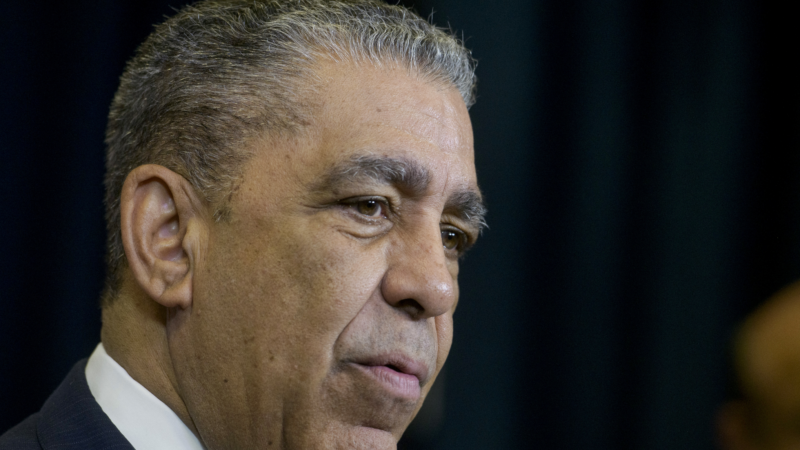Spanish-language rebuttal to Trump’s joint address focuses on immigration
New York Rep. Adriano Espaillat delivered the Democrats’ Spanish-language rebuttal to President Trump’s joint address to Congress Tuesday night, with a significant focus on the president’s immigration policy. In particular, Espaillat noted a recent executive order making English the national language and efforts to limit emergency aid.
“My people, although we have been here for 20 generations, 20 years or 20 days, we all came to the United States of America for the American dream — the possibility to achieve a better life and create a better future for our children by working hard, embracing diversity and taking the opportunity this great nation gives us all,” Espaillat said in Spanish.
Espaillat accused Trump of creating an “environment of fear among the immigrant community” and voiced his opposition to tariffs, proposed tax cuts and the recent reduction of the federal workforce. But he often refocused his speech to immigration.
He told the anecdote of working with House Minority Leader Hakeem Jeffries to help a “neighbor” who he alleges was detained by U.S. Immigration and Customs Enforcement despite being a U.S. citizen, though he did not give further detail.
“Trump’s migration policy is not designed the way he and his allies say, to deport those who really should be deported,” Espaillat said. “We want a new immigration law that secures the border, protects the DREAMers, the agricultural workers and maintains our families unified.”
Earlier that night, Trump spent portions of his remarks highlighting his immigration-related priorities, including his declaration of a national emergency along the U.S.-Mexico border, the deployment of military to the border and arrest rates.
U.S. Customs and Border Protection agents had about 30,000 encounters with migrants attempting to enter the U.S. illegally in January, the agency reported. CBP has not reported the numbers for February.
In his remarks, Trump asked for funding from Congress to carry out “the largest deportation operation in American history, larger even than current record holder President Dwight D. Eisenhower,” a reference to 1954’s “Operation Wetback,” — a racist term used to refer to migrants who crossed the Rio Grande River. The U.S. government estimates that the effort rounded up more than a million Mexican immigrants and some U.S. citizens.
Several guests at the joint address also highlighted Trump’s focus on immigration and border security. “Border czar” Tom Homan was a guest of House Speaker Mike Johnson. Guests of the White House included Roberto Ortiz, a U.S. Border Patrol agent who Trump said was shot by cartels while on duty, and the family members of Laken Riley and Jocelyn Nungaray. Riley was killed by men who entered the country illegally, and two men in the U.S. without legal status have been indicted in Nungaray’s death.
Follow for more coverage:
- 📧 NPR Politics newsletter: Breaking down the big stories and why they matter
- 🎧 NPR Politics Podcast: Our experts provide insights into what’s happening
- 📱 NPR app: Read the latest updates and stream your local station 24/7
Taiwan’s president pledges to defend island’s sovereignty after Chinese military drills
Taiwanese President Lai Ching-te vowed to defend the self-ruled island's sovereignty in the face of what he termed China's "expansionist ambitions," days after Beijing wrapped up live-fire military drills near its shores.
Deaths reported during widening protests in Iran sparked by ailing economy
The protests began due to economic pressures, with Iran's currency rapidly depreciating. Demonstrators have also chanted against the country's theocracy.
Congress failed to extend Obamacare subsidies. This Democrat says Trump can save them
Sen. Peter Welch, D-Vt., says he thinks the Senate can pass a "retroactive" Affordable Care Act subsidy extension, but "we need President Trump."
Rideshare union rights, social media limits and other state laws taking effect Jan. 1
Every new year, public media reporters across the country bring us some of the new state laws taking effect where they are. Here are six in 2026.
Guides to help you tackle your New Year’s resolutions
From building your strength to tackling credit card debt, NPR's Life Kit has a newsletter journey to help you tackle your New Year's resolution.
Guides to help you tackle your New Year’s resolutions
From building your strength to tackling credit card debt, NPR's Life Kit has a newsletter journey to help you tackle your New Year's resolution.






